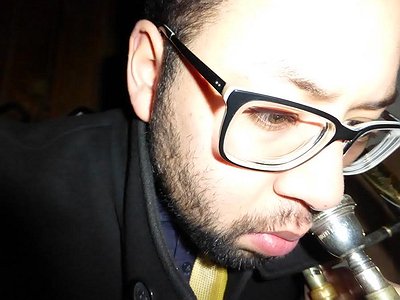Part 1
Name: Kris Reeder
Nationality: British
Occupation: Trombonist
Bands/Projects: 1984ensemble
Labels: EAF Records
Musiclal Recommendations: Joseph Beuys / Marcin Wolniewicz
When did you start playing your instrument, and what or who were your early passions or influences?
I started playing the Trombone when I was 11 and was inspired by the winners of the BBC Young Musician of Year Competition and local Brass teachers.
For most artists, originality is first preceded by a phase of learning and, often, emulating others. What was this like for you? How would you describe your own development as an artist and the transition towards your own voice?
I started off by emulating Miles Davis, a jazz trumpeter who has had a towering influence on the way I play and the way I live as an artist. I have since evolved into a complete artist by embracing music as a wider art form, drawing inspiration in my compositions from artists such as: Joseph Beuys, Barbara Kruger, Jackson Pollock. I feel that to live as a musician one must have a complete voice which encapsulates music, politics, culture etc.
Tell me about your instrument, please. How would you describe the relationship with it? What are its most important qualities and how do they influence the musical results – and possibly even your own performance?
I play the trombone. I have a deep relationship with it because, being brought up in a poor area of North Oxfordshire, when I was given the trombone on a free loan by the Oxfordshire County Music Service it made a huge difference to my life. I suppose you could say that playing the trombone was a comfort zone, somewhere to go to escape from it all. My music reflects that aspect of escaping from it all, not following pre-defined musical conventions, but living in the musical moment.
Many artists feel as though, at some point, certain people gave them the ”permission to do certain things”. How was that for you – in which way did the work of particular artists before you “allow” you to take decisions which were vital for your creative development?
A huge influence on the ‘freedom’ within my work is Joseph Beuys, the artist and social sculptor. His work has been vital within the context of my compositional freedom. The idea that ‘everyone is an artist’ and that ‘art is everywhere’ gave me licence to ignore the fixed boundaries within music and allowed me to challenge music, art and sound.
What were some of your main artistic challenges when starting out as an artist and in which way have they changed over the years?
One of the biggest obstacles for me throughout my career has been how to effectively engage an audience with my work. This is an open-ended question and one I am always asking myself. I have experienced both huge adoration and great dislike for me and my work and it fascinates me why audiences react in certain ways when presented with my work.
What do improvisation and composition mean to you and what, to you, are their respective merits?
Composition and improvisation are one and the same thing. To a certain extent, classical music academics have a monopoly on the term ‘composition’ but I feel that they are the same thing. I don’t get too hung up on semantics, I prefer to make music instead and let others worry about that.
How do you see the relationship between sound, space and performance and what are some of your strategies and approaches of working with them?
I am interested in space, context and sound and I am always exploring various facets of each. I'm particularly interested in the energy within a space and how that energy is different within different spaces and why.
Derek Bailey defined improvising as the search for material which is endlessly transformable. Regardless of whether or not you agree with his perspective, what kind of materials have turned to be particularly transformable and stimulating for you?
The Internet as a material, though abstract, with has been transformable and stimulating for me. It has created many answers, many questions and even more problems for me as an artist. Especially because it devalues art as a form whilst allowing sound and art to be endlessly transformed by others and multiple artists into anything and everything.





